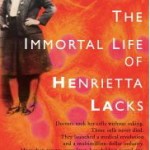Science Writing
Calling all academics: If you'd like a free advanced copy of my book, The Immortal Life of Henrietta Lacks, get thee to Random House's academic blog and request a copy quick, while supplies last (which probably won't be long at the rate things are going). See below for more information on the book, and advanced praise. Added bonus: If you teach the book this spring, you can also get me to come speak at your school/in your classes as part of my book tour.
Here's Publishers Weekly on The Immortal Life of Henrietta Lacks:
Science journalist Skloot makes a remarkable debut with
this multilayered…
Lots of excitement and news about my book, The Immortal Life of Henrietta Lacks (aka HeLa),
which hits stores February 2nd (after ten years in the works). It just got a starred review in Publishers Weekly and in Booklist, and was chosen as a Barnes & Noble Discover Great New Writers title for Spring 2010. Culture Dish is very excited about all of this. But the big news for this post is that I'm organizing a three-month-long book tour that will have me speaking nationwide at
universities, scientific organizations, bookstores, book groups, high schools, and
more. If you'd like me to speak…
Yes folks, it's that time again: Registration is now open for the great ScienceOnline2010 meeting that will take place (as always) in Durham, NC in January. The program features many great scientists, science bloggers, and science journalists, and promises to be lots of fun. I'll be running a session with Tom Levenson and Brian Switek called "From Blog to Book: Using Blogs and Social Networks to Develop Your Professional Writing," and I'll also be doing a hands-on, nuts-and-bolts workshop helping folks develop proposals for books and articles. See the program for details,…
My panel on "Communicating Science in the 21st Century" was last night at the Quantum to Cosmos Festival at the Perimeter Institute. I haven't watched the video yet-- Canadian telecommunications technology hates me, and I'm lucky to get a wireless connection to stay up for more than ten minutes-- but if the video feeds I've seen from other talks are an indication, it should be really good.
The panel wound up being primarily about journalism, which is understable given that the other four participants are all very distinguished journalists. I did my best to uphold the honor of the New Media…
I'm heading to the airport right after my second class today (I'm doing two weeks of our first-year seminar class), to appear at the Quantum to Cosmos Festival at the Perimeter Institute in Waterloo. This promises to be a good event-- I had a great time at the Science in the 21st Century workshop last fall, and they've got a great program lined up for the festival.
I'm most likely going to attend tonight's tv broadcast, and tomorrow's "Quantum Physics in 60 Minutes" lecture (I have a professional interest in seeing how the competition does things), but I'm making the trip in order to appear…
Lots of excitement here at Culture Dish: The final cover for The Immortal Life of Henrietta Lacks has arrived (see left). And ... <drum roll> ... the the book's first pre-publication review has hit the press: In the issue coming out this Monday, Publishers Weekly gives The Immortal Life a starred review, calling it, "a remarkable debut ... a rich, resonant tale of modern science, the wonders it can perform and how easily it can exploit society's most vulnerable people." (wOOt!) Full review here and here:
"Science journalist Skloot makes a remarkable debut with
this…
This book is, in some ways, a complement to Unscientific America. Subtitled "Talking Substance in an Age of Style," this is a book talking about what scientists need to do to improve the communication of science to the general public. This is not likely to make as big a splash in blogdom as Unscientific America, though, both because Randy has generally been less aggressive in arguing with people on blogs, and also because while he says disparaging things about science blogs, he doesn't name names, so nobody is likely to get their feelings hurt.
Olson is a scientist-turned filmmaker, who…
I'm a late addition to a Sunday panel at Worldcon:
Science Blogging - The New Science Journalism?
Touted as a new way of reaching the public, has science blogging matched its initial promise? Has it caused more problems than it solves?
Well? What do you all think?
I'm sitting here finding new and inventive ways to not write the pedagogical paper I'm working on at the moment. This seems like a good excuse for a poll!
The hardest part of writing a paper is:(survey)
As you can tell from the list of elements, I have scientific papers in mind, here, but other sorts of scholarly work are also fair game. The question is really what you find to be the absolute worst part to write when you're working on some sort of scholarly publication.
I'm talking specifically about the writing of the text, here. There are a whole host of headaches associated with…
No, this isn't another "How dare those journalists muddle the explanation of some scientific topic" post. The concept here is journalism itself, as seen in Ed Yong's discussion of different modes of science journalism. Writing about the recent World Conference of Science Journalists, he talks about some controversy over what "science journalism" actually means:
Certainly, the idea that journalism equated to talking or writing about science in any form was unpopular. In the opening plenary, Fiona Fox drew a fine line between science communication and journalism, the latter characterised…
One of the major problems contributing to the dire situation described in Unscientific America is that the incentives of academia don't align very well with the public interest. Academic scientists are rewarded-- with tenure, promotion, and salary increases-- for producing technical, scholarly articles, and not for writing for a general audience. There is very little institutionalized reward within academia for science popularization.
An extreme example of this is the failure of Carl Sagan's nomination to the National Academy of Sciences:
According to sources within the academy, Sagan was…
Tom Levenson has another excellent piece in his series on the writing of his forthcoming book on Newton, this one on hitting a wall:
The one bit of history specific to the Newton and the Counterfeiter project came when I hit a wall. I had written about a quarter of the manuscript by the autumn of 2006 - I'd even submitted a chunk of it to the departmental committee pondering my tenure case, which is as those of you in the academy will know, something of a fraught moment.
But as I tried to make the turn out of what was in essence back-story, my account of Newton's life up to the point of his…
When this first came out, I didn't pick it up, despite a glowing recommendation from Jennifer Ouellette, because NASCAR is one of the few things on ESPN that interests me less than baseball. I didn't really think I'd be interested in reading a whole book on the subject.
I saw Jennifer and Diandra on Bloggingheads a little while back, and she made it sound pretty interesting. And then I saw that she was giving a public lecture at DAMOP, and figured it would be good for airplane reading on the way down and back.
The Preface gives a nice description of how she came to write the book:…
I already mentioned this in a Links Dump, but there's enough buzz that it's probably worth a full post: the people at Three Quarks Daily have decided to offer prizes for blog writing:
Starting next month, the prizes will be awarded every year on the two solstices and the two equinoxes. So, we will announce the winner of the science prize on June 21, the arts and literature prize on September 22, the politics prize on December 21, and the philosophy prize on March 20, 2010.
About a month before the prize is to be announced we will solicit nominations of blog entries from our readers. The…
I'm speaking, of course, about this past weekend's Bloggingheads conversation between Jennifer Ouellette and Diandra Leslie-Pelecky. They both blog at Cocktail Party Physics, and Diandra has written The Physics of NASCAR.
It's a good Bloggingheads, covering a wide range of topics related to physics, sports, and entertainment. Jennifer talks about the work of the Science and Entertainment Exchange, Diandra talks about how NASCAR people know more about physics than you might think, and they both have worthwhile comments about the diificult job of explaining complicated technical subjects in…
We had a talk last night by Alan Lightman of MIT, a theoretical physicist and novelist, best known as the author of Einstein's Dreams. He spoke for about an hour about his own background, and the similarities and differences between the worlds of science and the arts.
One of the differences he mentioned was the way the different disciplines handle names. He claimed that science is deeply concerned with naming things, because naming a thing in some sense defines it-- the word "electron" carries with it a whole host of properties that are shared by all electrons in the universe. In the arts, on…
A couple of physics stories in the last few days have caught my attention for reasons that can be lumped together under the Vizzini Effect-- that is, they say things that involve unconventional uses of common words. Take, for example, the Physics World story Physicists distinguish between the indistinguishable, which starts off:
Spurred on by their work on building one of the world's most accurate atomic clocks from strontium-87 atoms, researchers in the US have now discovered that "forbidden" collisions can occur between these atoms.
Strontium-87 atoms belong to a class of objects known as…
What are the relative strengths and weaknesses of long-form, slow-bake, "mainstream" journalism and the idiom we call the blogosphere? As per Bora, the meaning of these terms are shifting as we speak. Last night, using my recent story and blogging on PTSD as a point of focus, I put in my latest two cents on this subject at my talk -- actually a long conversation with host and audience -- at the NYU Science, Health and Environmental Program's "Inside-Out" lecture series.
This was a crowd of writers, journalism profs, and journalism students, and I think we were all surprised at how many…
I'm pleased to announce that, starting in May 2009, I'll be writing a weekly science and health column for Slate's new Double X Magazine. I'll be covering any and all science that might be of interest to women (note: I won't just be covering science about specific female issues -- though I'll definitely cover those). Here, from Double X's website, is a description of the new magazine:
Double X is a new Web magazine, founded by women but not just for women, that Slate will launch in spring 2009. The site will spin off from Slate 's XX Factor blog,
where we'…
Illustration by David Parkins, Nature
Today, Nature released a news feature by Geoff Brumfiel on the downturn in mainstream science media. We've all known that this is happening; the alarms become impossible to ignore when Peter Dysktra and his team at CNN lost their jobs last year. For mainstream outlets like CNN or the Boston Globe to cut science may seem appalling - but in an unforgiving economic climate which has already triggered the collapse of major newspapers like the Seattle Post-Intelligencer, such cuts are logical, because science reporting isn't a big money-maker. The question…



